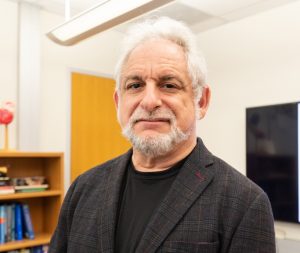
Dr. Michael Sacks, University of Texas, will present a lecture on Monday, February 7, 2022, at 12:00 pm, in Rekhi Hall Room G005. The lecture can also be attended virtually via Zoom.
The lecture is sponsored by the Michigan Tech Institute of Computing and Cybersystems (ICC).
Dr. Sacks is a professor of biomedical engineering and the W. A. “Tex” Moncrief, Jr. Endowment in Simulation-Based Engineering Science Chair. He is also director of the Willerson Center for Cardiovascular Modeling and Simulation. His research focuses on simulation of the function of the heart and its valves using a multiscale modeling at the cellular, tissue, and organ levels. His research center addresses both fundamental questions and clinical applications utilizing state-of-art computational methods and imaging technologies.
Lecture Title
Neural Network Finite Element Modeling of the Heart Mechanics. A new look at an old problem.
Lecture Abstract
The full characterization and modeling of three-dimensional (3D) mechanical behaviour the myocardium is essential in understanding the function of the heart in health and disease. The hierarchical structure of the myocardium results in their highly anisotropic mechanical behaviors, with the spatial variations in fiber structure giving rise to heterogeneity. We have developed a novel numerical-experimental approach to determine the optimal parameters for 3D constitutive models of the myocardium using optimal design of full 3D kinematically controlled (triaxial) experiments coupled to an inverse model of the experiment and local fibrous structure. Due to the natural variations in structures, the mechanical behaviors of myocardium can vary dramatically within the heart. Thus, to obtain the responses of the myocardium with different realizations of structures, the resulting hyperelastic problem needs to be solved with spatially varying parameters and in certain cases different boundary conditions.
To alleviate the associated computational costs at the time of simulation, we have developed a neural network-based direct PDE solution method. The resulting neural network was then trained in a physics-informed approach by searching for θ that minimizes the potential energy of the hyperelastic problem on the training dataset generated by sampling over the physiological range. The present method is intended for the low data problem; it does not require generating a large, labelled training datasets, which are also computationally intractable. The neural network model was trained with satisfactory convergence, it can be used to give fast predictions of complex 3D deformations in full kinematic space with population-based fiber structures by forward passes in the neural network. Due to their transfer learnability characteristics, the neural network on subsequent specimens more quickly. I will also present scaled up for complete organ-level cardiac models to provide efficient and robust computational models for to improve patient outcomes in clinically relevant timeframes
Speaker Bio
Professor Sacks is a world authority on cardiovascular modeling and simulation, particularly on developing patient-specific, simulation-based approaches for the understanding and treatment of heart and heart valve diseases. His research is based on multi-scale modeling, quantification, and simulation of the biophysical behavior of the constituent cells and tissues and translation to the organ level in health, disease, and treatment. For example, he has developed novel non-invasive methods to quantify pre- and post-surgical state of the mitral valve from pre-surgical clinical images.
He has determined how local stress environments of heart valve interstitial cells alter their biosynthetic responses in the context of altered heart and valvular organ-level responses. His research also includes developing novel cardiac models to simulate growth and remodeling of the myocardium in pulmonary hypertension, the first full 3D approach for left ventricular myocardium mechanical behavior. Dr. Sacks is also active in modeling replacement heart valve materials and in understanding the in-vivo remodeling processes.
Selected Recognitions
Fellow, American Heart Association
Fellow, American Society of Mechanical Engineers
Fellow, Biomedical Engineering Society (Inaugural)
Fellow, American Institute for Medical and Biological Engineering
Van C. Mow Medal, American Society for Mechanical Engineers Bioengineering Division
Chancellor’s Distinguished Research Award, University of Pittsburgh
Former Editor of the Journal of Biomechanical Engineering
Education
Ph.D., Biomedical Engineering, University of Texas Southwestern Medical Center at Dallas
M.S., Engineering Mechanics, Michigan State University
B.S. Engineering Mechanics, Michigan State University